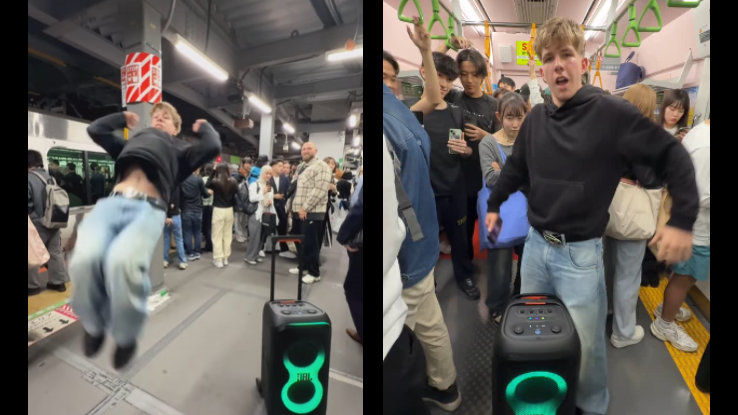Foreign influencer’s disruptive stunts on Tokyo public transport cause outrage

The behavior of a foreign influencer in Japan has ignited a wave of criticism and public outcry after videos of his disruptive stunts on crowded public transportation circulated widely online.
The individual, known as “Sigma Boy” on social media platforms like Instagram where he boasts nearly one million followers, has been documented engaging in nuisance activities such as playing loud music from a large portable speaker and performing acrobatic maneuvers, including backflips, on packed trains and station platforms.
Since reportedly arriving in Japan a few days ago, “Sigma Boy” has been posting videos of his antics, not only on the busy JR Yamanote Line, the main loop line serving central Tokyo, but also on the Tokyo Metro and other public transit systems.
These videos typically depict him suddenly activating a large, carry-bag shaped speaker to blast loud music in crowded carriages, causing fellow passengers to turn and stare with expressions of bewilderment and annoyance.
In one recurring scenario, he is seen exiting a train onto a platform and then performing a backflip, often in close proximity to other commuters.
The dissemination of these videos across various social media platforms has been met with a barrage of condemnation from Japanese users and international viewers alike.
The online reaction has been overwhelmingly negative, with many expressing anger and frustration over the blatant disregard for public etiquette and the inconvenience caused to ordinary commuters.
Harsh comments have flooded social media, reflecting the public’s disapproval.
Calls for intervention by authorities have been prominent, with numerous users demanding action. “Arrest them,” one commenter wrote, while another suggested, “Let’s pour water on the speakers.”
More forceful reactions included, “Kick them out” and “They should be arrested immediately and deported!”

Many commenters also expressed bewilderment at the apparent lack of direct confrontation from fellow passengers.
“Why doesn’t anyone tell them off?” one user questioned, highlighting a potential cultural reluctance to directly address such behavior in public spaces.
Others simply conveyed their irritation, stating, “This is really annoying.”
The lack of immediate intervention by passengers, as noted in some online comments, could be attributed to various factors, including a desire to avoid confrontation, language barriers, or a general sense of surprise and uncertainty about how to respond to such unusual behavior.
However, the strong online backlash indicates a clear disapproval of the influencer’s actions and a desire for them to cease.
The individual concerned has also shared content of similar antics in other countries, such as Korea, indicating that they have little to no regard for the cultural norms of the country they are visiting, and that their primary focus is simply to create content regardless of the inconvenience to others.
The incidents have sparked a broader discussion about the responsibilities of social media influencers, particularly foreign nationals visiting Japan, to respect local customs and laws.
While the influencer appears to be seeking attention and engagement through these unconventional displays, his actions are being widely interpreted as disrespectful and disruptive to the daily lives of Tokyo’s commuters.
While this latest incident involves someone being a public nuisance, previous “influencer” incidents have involved acts such as attacking event staff with snowballs which can be considered criminal behavior.
The increasing visibility and negative reception of such behavior by foreign influencers in Japan may prompt a closer examination of public order regulations and the potential consequences for those who intentionally disrupt public spaces for online content.
Source: Encount
This post may contain affiliate links, and Essential Japan may earn a commission if you purchase through them.






